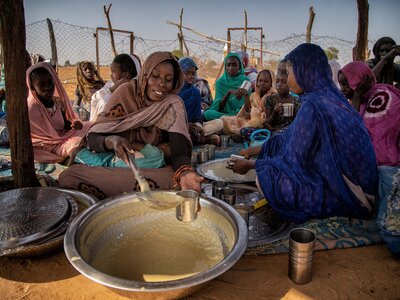Mauritanie
- 87ème sur 116
- dans l'indice de la faim dans le monde
- 0.4%
- du territoire est arable
- 45 %
- des enfants ne sont pas scolarisés
La République islamique de Mauritanie est confrontée à d'importants défis liés à sa faible densité démographique et à l'aridité de ses paysages, qui exacerbent l'insécurité alimentaire et la malnutrition. Les sécheresses et les inondations récurrentes, intensifiées par le changement climatique, ont rendu près de 365 000 personnes vulnérables, dont plus de 13 % souffriront de malnutrition aiguë pendant la période de soudure de 2024.
La Mauritanie dépend fortement de l'agriculture et du pastoralisme. Cependant, seulement 0,4 % de ses terres sont propices à l'agriculture, ce qui est encore compliqué par des environnements dégradés et des infrastructures de marché médiocres. Cette situation contribue à des taux de pauvreté et de chômage élevés, en particulier dans les zones rurales où réside 70 % de la population.
Le Programme alimentaire mondial (PAM), en collaboration avec le gouvernement mauritanien et ses partenaires, est le fer de lance des efforts de renforcement de la résilience, comme notre assistance alimentaire pour les actifs et les activités de repas scolaires.
La Mauritanie est également confrontée à des défis en tant que pays d'accueil de plus de 122 000 réfugiés maliens dans le camp de Mbera, ce qui met à rude épreuve des ressources déjà limitées. Les interventions du PAM constituent une bouée de sauvetage, offrant un soutien comprenant des distributions de nourriture et des services de lutte contre la malnutrition, en mettant l'accent sur le renforcement de l'autosuffisance.
Le PAM soutient le programme national de repas scolaires, afin que les enfants ne quittent pas l'école à cause de la faim ou de la nécessité de travailler pour subvenir aux besoins de leur famille.
Le PAM intègre des approches transformatrices en matière de genre afin d'autonomiser les femmes et de promouvoir l'égalité dans les initiatives de nutrition et de développement communautaire.
Ce que fait le Programme alimentaire mondial en Mauritanie
-
Réponse à la crise
-
Le PAM se concentre sur l'assistance aux populations touchées par la crise, en particulier les réfugiés maliens, en mettant l'accent sur la transition vers l'autosuffisance. Le PAM vise à fournir des paquets humanitaires complets, y compris de la nourriture, des repas scolaires et un soutien nutritionnel. En outre, le PAM fournit une assistance en espèces pour la sécurité alimentaire et des achats spécifiques liés à la nutrition.
-
Renforcement de la résilience
-
Protection sociale/renforcement des capacités
-
Logistique
Mauritanie - Communiqués de presse
Allez sur la pageContacts
Office
Ilot K Lot No. 217A, Nouakchott, Mauritania
Nouakchott
Mauritanie



